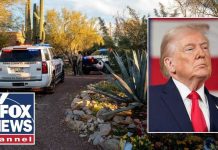
Since his first day back in office, President Trump wielded his pardon power like a sledgehammer against federal law enforcement, granting blanket clemency to nearly 1,600 individuals convicted of crimes related to the January 6, 2021 Capitol attack in what legal scholars are calling an unprecedented assault on the rule of law.
Story Snapshot
- Trump issued mass pardons to nearly 1,600 January 6 defendants, marking the first time a president has pardoned crimes against the democratic process
- Legal experts and Justice Department officials condemned the move as undermining federal law enforcement and encouraging future political violence
- The pardons were framed as correcting a “grave national injustice” but have deepened political polarization and institutional distrust
- Additional symbolic pardons followed, including “Alternate Electors of 2020” despite no pending federal charges
The Unprecedented Scale of Presidential Clemency
Trump’s January 20, 2025 clemency declaration shattered historical precedent by targeting individuals who participated in a direct assault on Congress during the certification of electoral votes. Unlike previous controversial pardons that involved individual cases of questionable justice, this blanket forgiveness covered organized groups including members of the Oath Keepers and Proud Boys who had been convicted of seditious conspiracy and violence against law enforcement officers.
The scope defied legal norms established over centuries of American jurisprudence. While presidents have traditionally used clemency as a tool of mercy for individual cases or to address systemic injustices, Trump deployed it as a political weapon to effectively nullify an entire federal investigation. This move sent shockwaves through the Justice Department, where prosecutors had spent years building cases against defendants who caused millions in damage and injured over 140 police officers.
Justice Department Officials Sound the Alarm
Senior Justice Department officials didn’t mince words in their assessment, describing the pardons as a “green light” for political violence. The institutional memory of federal law enforcement stretches back decades, yet veterans of the department struggled to find historical parallels for such a brazen dismissal of prosecutorial work. These weren’t cases of prosecutorial overreach or questionable evidence but convictions secured through overwhelming documentation, including defendants’ own social media posts and video evidence.
The message to federal prosecutors was clear and demoralizing: years of painstaking investigative work could be wiped away with a presidential signature. Randall Eliason of George Washington University Law captured the sentiment of many legal professionals, calling the pardons an “abuse of power” that signals crimes committed on behalf of Trump would face no consequences. This precedent threatens the foundational principle that no one, regardless of political affiliation, stands above the law.
The Political Strategy Behind Mass Forgiveness
Trump’s decision wasn’t impulsive but represented the culmination of years of political messaging that reframed convicted criminals as “political prisoners.” Throughout 2022-2024, he repeatedly promised pardons if reelected, using the January 6 prosecutions as a rallying cry for his base. This strategy transformed legitimate law enforcement into partisan persecution in the minds of his supporters, creating political cover for the unprecedented clemency grant.
The timing on his first day in office sent an unmistakable signal about priorities. Before addressing traditional presidential concerns like national security briefings or economic policy, Trump chose to overturn the work of federal prosecutors. This sequencing revealed the pardons as fundamentally about loyalty and political theater rather than justice or mercy. The move energized his base while simultaneously demonstrating his willingness to use executive power to protect political allies.
Long-Term Consequences for American Democracy
Counterterrorism researchers warn these pardons may encourage future political violence by demonstrating that consequences can be erased through political connections. The January 6 prosecutions served as a deterrent to others contemplating similar actions, establishing that attacking democratic institutions carries severe personal costs. Trump’s clemency grants effectively neutered that deterrent effect, potentially emboldening extremist groups planning future actions.
The institutional damage extends beyond immediate security concerns to the broader credibility of American justice. When presidential power can nullify years of federal prosecutions based purely on political loyalty, the principle of equal justice under law becomes meaningless. This erosion of institutional authority creates dangerous precedents that future presidents may exploit, regardless of party affiliation. The American experiment in self-governance relies on shared respect for democratic norms and institutions that these pardons directly undermine.
Sources:
Wikipedia: Pardon of January 6 United States Capitol attack defendants
U.S. Department of Justice: Clemency Grants by President Donald J. Trump (2025-Present)









